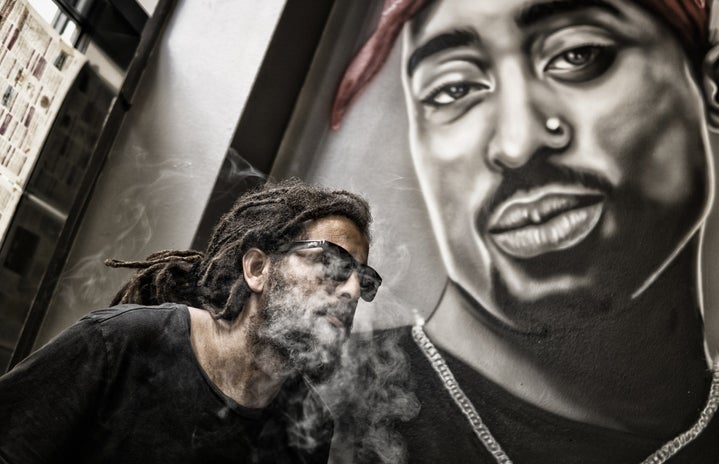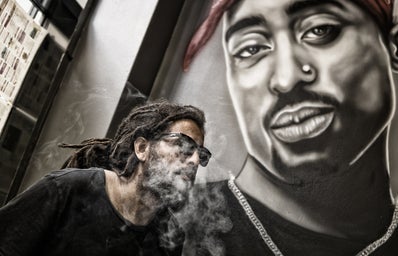In 1989, rap group NWA received warnings from the Detroit police department that if they performed “F*** Tha Police” at Joe Louis Arena, they would be reprimanded. Despite these warnings, the group proceeded to practice their First Amendment right and perform the song. Police unplugged the amplifiers, inciting riots that led to the arrest of 18 people that night.
“F*** Tha Police” and songs with similar themes have been consistently misinterpreted by white people and authorities for decades. Controversial lyrics that speak out against police brutality, social inequality, violent interpersonal relations, and so forth tend to be taken as acts of disobedience or disruption rather than their true meaning.
Related: Is Mumble Rap Harmful to Rap as a Whole?
In order to get a better understanding of hip hop’s influences and reactions, I spoke with a colleague of mine at George Mason University, Nautia Smalls. Her academic major is Government and International Politics with a concentration in International Relations. She has a powerful voice and a lot to bring to the issue, so let’s get into it.
Simply taking a look at history will tell us how black lyricism began to be judged negatively. In the early 1980s and throughout the 1990s, hip hop and rap music emerged in the same time period as Reaganomics, the AIDs crisis, and (as Smalls sarcastically puts it) “beautiful, Republican America.” While the rich were getting richer, the poor were getting poorer, and black hip hop artists rose onto a new scene to create a better sense of “representation.” Through music, they were able to use their voices which were previously quieted, and push their stories of injustices into the mainstream. However, some mistook and continue to mistake the lyrics for delinquency. These seemingly shocking or harsh lyrics are their reality, and it’s important to understand the context of history surrounding them. Let’s take a look at some of the actual lyrics to a few songs:
“Lights start flashin’ behind me
But they’re scared of a n**** so they mace me to blind me”
– F*** Tha Police (NWA, 1988)
“They put out my picture with silence
‘Cause my identity by itself causes violence”
– F*** Tha Police (NWA, 1988)
“I’m doin the knowledge, it’s not easy, easy
Watchin’ a cop cuff a kid for sellin’ a clip to a D.T.
But it’s home, so I flex, get pressure’s off my chest
Slip in a tape, now which hood should I hit next”
– Just Another Day… (Queen Latifah, 1993)
“My mind won’t allow me to not be curious
My folk don’t understand so they don’t take it serious
But every now and then, I wonder
If the gate was put up to keep crime out or to keep our ass in.”
– Cell Therapy (Goodie Mob, 1995)
“See, my pedigree most definitely don’t tolerate the front
Shit I’ve been through prolly offend you
This is Paula’s oldest son
I know murder, conviction
Burners, boosters, burglars, ballers, dead, redemption
Scholars, fathers dead with kids”
– DNA (Kendrick Lamar, 2017)
In response to songs with this theme, Smalls says, “you can hear and understand in their voice [and] how they’re delivering their lyrics that they understand what it is like to see their friends be arrested, or be targeted by racism, or to be thrown under the jail by the system. And that’s what a lot of people forget about rap.” She continues expanding on the issue, explaining that white people “don’t know what it’s like to be pulled over by the cops and be afraid [for] their lives, [and] they don’t know what it’s like for their entire neighborhood to be gentrified and have nowhere to go.” Because they cannot relate to the topics being discussed, white people and authorities tend to lash back against it, and see it only as troublemaking and noncompliance with rules. Furthermore, it can often be the case that what whites have been taught is false and, in effect, racist. Smalls adds, “we’re more than what you see, we’re more than what you choose to see, and we’re more than what is depicted in the media,” which is, more times than not, false perceptions of the black community.
Related: Why It’s So Important That ‘The Hate U Give’ is Told From a Black Female Perspective
We’ve discussed and figured out why black lyricism gets misconstrued, primarily by non-POCs, and how these songs act as vessels to highlight their realities. But, it’s also important to note that not all hip hop and rap is about misfortunes and oppression. Other key topics are community, togetherness and appreciation for the culture.
As a child, Smalls grew up listening to her father and stepfather’s hip hop albums. Her favorites included Run DMC, LL Cool J, Tupac Shakur, Goodie Mob, and A Tribe Called Quest. Listening to these artists taught her that the art in hip hop and rap comes from its ability to bring awareness to issues as well as celebrate the culture. Tupac recognizes the power of family in his 1993 song “Keep Ya Head Up”:
“I huffed and puffed about my curfew and broke the rules
Ran with the local crew, and had a smoke or two
And I realize momma really paid the price
She nearly gave her life, to raise me right.”
Related: Kelly Thomas and the Prevalence of Police Brutality in America
The misinterpretation of rap lyrics is not something that is reserved to the beginnings of the genre, nor have the issues from the 1980s and 1990s been resolved. Today’s biggest artists such as J. Cole, Kendrick Lamar and even 21 Savage have songs that express both frustration with the treatment of black people and appreciation for the resilience of black culture. In his song “A Lot,” 21 Savage tells the audience:
“My brother lost his life and it turned me to a beast
My brother got life and it turned me to the streets
I been through the storm and it turned me to a G
But the other side was sunny, I get paid to rap on beats.”
Smalls interprets these songs as “taking your platform as an artist and using it to be an advocate, or using it to celebrate.”
In one final quote, Smalls voices what she hopes people will remember before they deem a hip hop song ‘offensive’: “At the end of the day, I find it funny how so many people want to dictate and tell us we shouldn’t say this or say that, but it’s our history, it’s our truth. This is us.”
A link to a Spotify playlist with all songs mentioned and related to this article can be found here.


